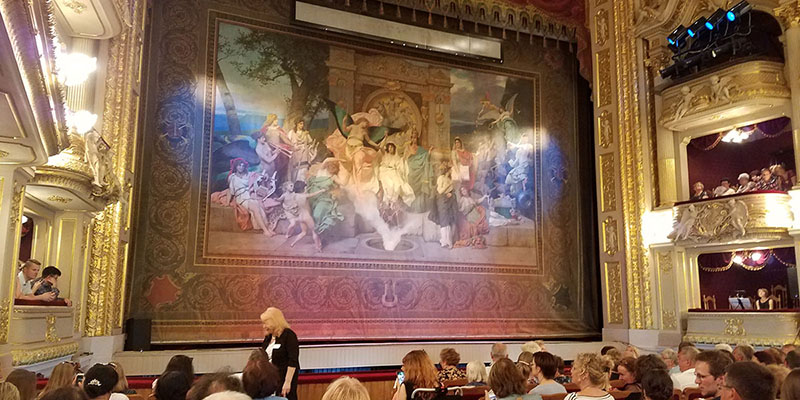8.2 Accusative Case after the Prepositions в/у, на and про

In this module, you will become familiar with the meanings of prepositional phrases with prepositions в/у, на and про followed by nouns in the accusative case, as well as with the most common contexts in which these phrases are used.
Завда́ння 1
Read the sentences below and note how the preposition в is used.
У четве́р ми йде́мо в бібліоте́ку.
У субо́ту ми ї́демо в Ха́рків.
It actually has two different meanings: “on” with days of the week and “to” indicating direction of motion with places. Yet in both instances, it is followed by a noun in the accusative case.
Mark all the nouns in accusative case in the text below and then answer the questions that follow.
Важли́во!
As covered in Unit 7, one way to express movement to a place is to use the preposition до + the genitive case. The exercise above introduces another way to express the same meaning by using the preposition в (or its variant у) + the accusative case. When the destination is a building or an institution, both ways are possible and are equivalent:
Я йду до університе́ту. = Я йду в університе́т.
However, if the destination is specifically to visit a person (for ex., “to grandma’s”), only the construction with до is possible:
Я йду до бабу́сі.
Завда́ння 2
Note that just like the preposition в (or its variant у), the preposition на can be followed by the accusative case to indicate the direction of movement or action – i.e., “go to the sea,” “invite to dinner,” etc. The rules for using на instead of в are covered in Unit 4.2 on the locative case.
Батьки́ ї́дуть в Хорва́тію на мо́ре.
Оле́г запроси́в мене́ в рестора́н на вече́рю.
Complete the sentences below paying careful attention to context and to what you have learned about the use of accusative case thus far.
Важли́во!
As you can see from this Module, prepositions в (or у) and на can be followed either by the locative case or by the accusative case when used with places or events. The difference is in meaning.
When followed by the locative case, these prepositional phrases denote location in or at a place or an event:
Я за́раз в університе́ті на ле́кції.
When followed by the accusative case, these prepositional phrases denote the direction of movement or action – to a place or an event:
Я йду в університе́т на ле́кцію.
Завда́ння 3
Complete the dialogue using the nouns below in their correct forms.
прогулянка | фільм | побачення | парк | фестиваль | ресторан | школа | кіно | центр
Завда́ння 4
Read the dialogues and mark all nouns in the accusative case. Then answer the questions that follow.
Завда́ння 5
You will hear eight unfinished sentences. Choose the most appropriate ending word for each.
Transcript – Завдання 5
- Я люблю їсти яєчню і пити каву на…
- Вчора я дві години чекала на…
- Влітку ми дуже любимо їсти морозиво на…
- Чи можна замовити столик на чотири… ?
- Ти хочеш салат на…?
- Українці часто їдять суп на…
- Ти можеш приготувати велику піцу на вісім…?
- Сьогодні вранці ми сорок хвилин чекали на…
Завда́ння 6
Note the use of the accusative case after the preposition про (‘about’) in these descriptions of famous works:
«Роме́о і Джульє́тта» – це відо́мий твір про любо́в.
«Ґа́рфілд» – це відо́мий ко́мікс про кота́.
Complete the sentences below with the most logical conclusion.
Завда́ння 7
Complete the sentences below paying careful attention to context and to what you have learned about the use of accusative case thus far.
Завда́ння 8
Complete the dialogue by providing the missing prepositions (в, у, на or про).
Мо́вний пазл
Look through the activities you have just completed and choose the correct statements below to summarize what you have learned.
А тепе́р тест!
Complete the informal email below by providing the proper form of the given nouns.
Croatia
work (of literature, art, etc.)

